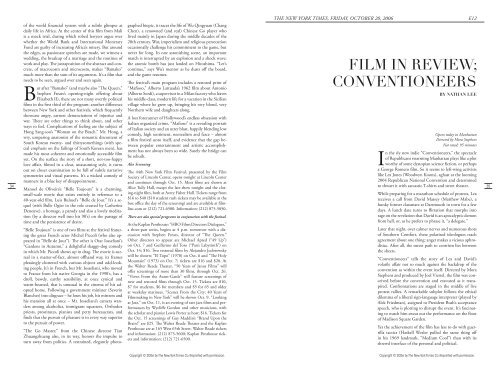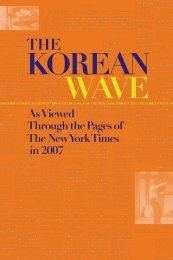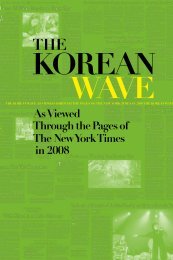The Korean Wave 2006 - Korean Cultural Service
The Korean Wave 2006 - Korean Cultural Service
The Korean Wave 2006 - Korean Cultural Service
Create successful ePaper yourself
Turn your PDF publications into a flip-book with our unique Google optimized e-Paper software.
34<br />
of the world financial system with a subtle glimpse at<br />
daily life in Africa. At the center of this film from Mali<br />
is a mock trial, during which robed lawyers argue over<br />
whether the World Bank and International Monetary<br />
Fund are guilty of increasing Africa’s misery. But around<br />
the edges, as passionate speeches are made, we witness a<br />
wedding, the breakup of a marriage and the routines of<br />
work and play. <strong>The</strong> juxtaposition of the abstract and concrete,<br />
of macrocosm and microcosm, makes “Bamako’’<br />
much more than the sum of its arguments. It’s a film that<br />
needs to be seen, argued over and seen again.<br />
But after “Bamako” (and maybe also “<strong>The</strong> Queen,”<br />
Stephen Frears’s opening-night offering about<br />
Elizabeth II), there are not many overtly political<br />
films in the first third of the program: another difference<br />
between New York and other festivals, which frequently<br />
showcase angry, earnest denunciations of injustice and<br />
war. <strong>The</strong>re are other things to think about, and other<br />
ways to feel. Complications of feeling are the subject of<br />
Hong Sang-soo’s “Woman on the Beach.” Mr. Hong, a<br />
wry, unsparing anatomist of the romantic discontent of<br />
South <strong>Korean</strong> twenty- and thirtysomethings (with special<br />
emphasis on the failings of South <strong>Korean</strong> men), has<br />
made his most coherent and emotionally accessible film<br />
yet. On the surface the story of a short, not-too-happy<br />
love affair, filmed in a clear, unassuming style, it turns<br />
out on closer examination to be full of subtle narrative<br />
symmetries and visual patterns. It’s a wicked comedy of<br />
manners in a blue key of disappointment.<br />
Manoel de Oliveira’s “Belle Toujours” is a charming,<br />
small-scale movie that exists entirely in reference to a<br />
40-year-old film, Luis Buñuel’s “Belle de Jour.” It’s a sequel<br />
(with Bulle Ogier in the role created by Catherine<br />
Deneuve), a homage, a parody and also a lovely meditation<br />
(by a director well into his 90’s) on the passage of<br />
time and the persistence of desire.<br />
“Belle Toujours” is one of two films at the festival featuring<br />
the great French actor Michel Piccoli (who also appeared<br />
in “Belle de Jour”). <strong>The</strong> other is Otar Iosseliani’s<br />
“Gardens in Autumn,” a delightful shaggy-dog comedy<br />
in which Mr. Piccoli shows up in drag. <strong>The</strong> movie is surreal<br />
in a matter-of-fact, almost offhand way, its frames<br />
pleasingly cluttered with curious objects and odd-looking<br />
people. It’s in French, but Mr. Iosseliani, who moved<br />
to France from his native Georgia in the 1990’s, has a<br />
droll, bawdy, earthy sensibility, at once cynical and<br />
warm-hearted, that is unusual in the cinema of his adopted<br />
home. Following a government minister (Severin<br />
Blanchet) into disgrace – he loses his job, his mistress and<br />
his mansion all at once – Mr. Iosseliani’s camera wanders<br />
among alcoholics, immigrant squatters, Orthodox<br />
priests, prostitutes, pianists and petty bureaucrats, and<br />
finds that the pursuit of pleasure is in every way superior<br />
to the pursuit of power.<br />
“<strong>The</strong> Go Master,” from the Chinese director Tian<br />
Zhuangzhuang also, in its way, honors the impulse to<br />
turn away from politics. A restrained, elegantly photographed<br />
biopic, it traces the life of Wu Qingyuan (Chang<br />
Chen), a renowned (and real) Chinese Go player who<br />
lived mainly in Japan during the middle decades of the<br />
20th century. War, imperialism and religious persecution<br />
occasionally challenge his commitment to the game, but<br />
never for long. In one astonishing scene, an important<br />
match is interrupted by an explosion and a shock wave:<br />
the atomic bomb has just landed on Hiroshima. “Let’s<br />
continue,” says Wu’s mentor as he dusts off the board,<br />
and the game resumes.<br />
<strong>The</strong> festival’s main program includes a restored print of<br />
“Mafioso,” Alberto Lattuada’s 1962 film about Antonio<br />
(Alberto Sordi), a supervisor in a Milan factory who leaves<br />
his middle-class, modern life for a vacation in the Sicilian<br />
village where he grew up, bringing his very blond, very<br />
Northern wife and daughters along.<br />
A lost forerunner of Hollywood’s endless obsession with<br />
Italian organized crime, “Mafioso” is a revealing portrait<br />
of Italian society and an utter blast, happily blending low<br />
comedy, high sentiment, neorealism and farce – almost<br />
a film festival unto itself, and evidence that the gap between<br />
popular entertainment and artistic accomplishment<br />
has not always been so wide. Surely the bridge can<br />
be rebuilt.<br />
Also Screening<br />
<strong>The</strong> 44th New York Film Festival, presented by the Film<br />
Society of Lincoln Center, opens tonight at Lincoln Center<br />
and continues through Oct. 15. Most films are shown at<br />
Alice Tully Hall, except the late show tonight and the closing-night<br />
film, both at Avery Fisher Hall. Tickets range from<br />
$16 to $40 ($10 student rush tickets may be available at the<br />
box office the day of the screening) and are available at filmlinc.com<br />
or (212) 721-6500. Information: (212) 875-5050.<br />
<strong>The</strong>re are also special programs in conjunction with the festival.<br />
At the Kaplan Penthouse: “HBO Films Directors Dialogues,”<br />
a three-part series, begins at 4 p.m. tomorrow with a discussion<br />
with Stephen Frears, director of “<strong>The</strong> Queen.”<br />
Other directors to appear are Michael Apted (“49 Up”)<br />
on Oct. 7 and Guillermo del Toro (“Pan’s Labyrinth”) on<br />
Oct. 14; $16. Two restored films by Alejandro Jodorowsky<br />
will be shown: “El Topo” (1970) on Oct. 6 and “<strong>The</strong> Holy<br />
Mountain” (1973) on Oct. 7; tickets are $16 and $20. At<br />
the Walter Reade <strong>The</strong>ater, “50 Years of Janus Films” will<br />
offer screenings of more than 30 films, through Oct. 26.<br />
“Views From the Avant-Garde” will feature screenings of<br />
new and restored films through Oct. 15. Tickets are $10,<br />
$7 for students, $6 for members and $5 for 65 and older<br />
at weekday matinees. “Scenes From the City: 40 Years of<br />
Filmmaking in New York’’ will be shown Oct. 9. “Looking<br />
at Jazz,” on Oct. 11, is an evening of rare jazz films and performances<br />
by Wycliffe Gordon and other musicians, with<br />
the scholar and pianist Lewis Porter as host; $16. Tickets for<br />
the Oct. 15 screenings of Guy Maddin’s “Brand Upon the<br />
Brain!” are $25. <strong>The</strong> Walter Reade <strong>The</strong>ater and the Kaplan<br />
Penthouse are at 165 West 65th Street. Walter Reade tickets<br />
and information: (212) 875-5600; Kaplan Penthouse tickets<br />
and information: (212) 721-6500.<br />
<strong>The</strong> New York Times, Friday, October 20, <strong>2006</strong><br />
E12<br />
Film in Review;<br />
Conventioneers<br />
By NATHAN LEE<br />
Opens today in Manhattan<br />
Directed by Mora Stephens<br />
Not rated; 95 minutes<br />
In the sly new indie “Conventioneers,” the spectacle<br />
of Republicans swarming Manhattan plays like a plot<br />
worthy of some dystopian science fiction, or perhaps<br />
a George Romero film. So it seems to left-wing activists<br />
like Lea Jones (Woodwyn Koons), aghast at the looming<br />
2004 Republican National Convention and determined<br />
to thwart it with sarcastic T-shirts and street theater.<br />
While preparing for a marathon schedule of protests, Lea<br />
receives a call from David Massey (Matthew Mabe), a<br />
hunky former classmate at Dartmouth in town for a few<br />
days. A lunch date turns to flirtation that morphs into<br />
rage on the revelation that David is an apocalyptic demon<br />
from hell, or, as he prefers to phrase it, “a delegate.”<br />
Later that night, over calmer nerves and numerous shots<br />
of Southern Comfort, these polarized ideologues reach<br />
agreement about one thing: anger makes a vicious aphrodisiac.<br />
After all, the surest path to centrism lies between<br />
the sheets.<br />
“Conventioneers” tells the story of Lea and David’s<br />
volatile affair not so much against the backdrop of the<br />
convention as within the event itself. Directed by Mora<br />
Stephens and produced by Joel Viertel, the film was conceived<br />
before the convention and executed as it transpired.<br />
Confrontations are staged in the middle of live<br />
protest rallies. A remarkable subplot follows the ethical<br />
dilemma of a liberal sign-language interpreter (played by<br />
Alek Friedman), assigned to President Bush’s acceptance<br />
speech, who is plotting to disrupt the event. It’s fascinating<br />
to watch him sweat out the performance on the floor<br />
of Madison Square Garden.<br />
Yet the achievement of the film has less to do with guerrilla<br />
tactics (Haskell Wexler pulled the same thing off<br />
in his 1969 landmark, “Medium Cool”) than with its<br />
shrewd interface of the personal and political.<br />
35<br />
Copyright © <strong>2006</strong> by <strong>The</strong> New York Times Co. Reprinted with permission.<br />
Copyright © <strong>2006</strong> by <strong>The</strong> New York Times Co. Reprinted with permission.





